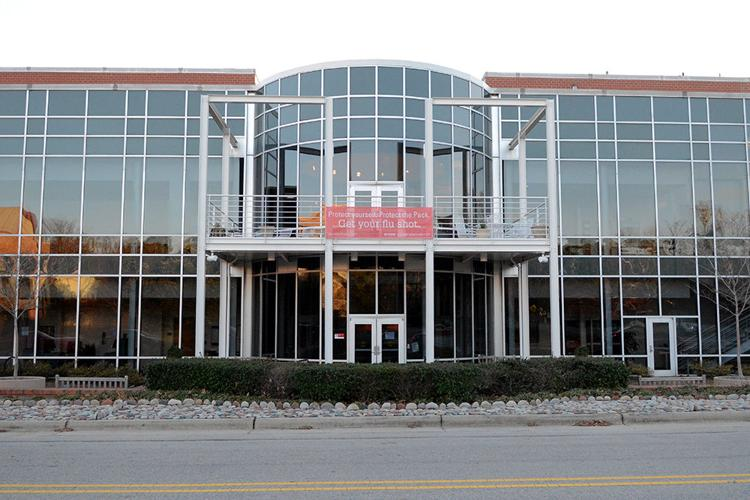Drop-in spaces offer casual, non-committal spaces for conversation and community-building, including over 15 programs tailored to the unique identities of the broader NC State community.
Rose Jerome, outreach and resiliency coordinator at Prevention Services, said the drop-in spaces involve a wide-range of campus entities, including Prevention Services, the Counseling Center, Mental Health Ambassadors and collaborations with the African American Cultural Center, the Women’s Center and even the department of horticultural science.
“Our drop-in services are basically these non-committal spaces that we want students to make full use of,” Jerome said. “The reason we have them is to try to accommodate that students may have a variety of different interests, and also availability… The whole goal is centered around increasing belonging and social wellness because we know the more students feel connected to each other, the more that assists with retention rates, with feeling supported by community, a positive impact on overall mental health and just their time here at NC State.”
Maggie Johnston, graduate assistant at Prevention Services and student in the Educational Leadership, Policy and Human Development Ph.D. program, added that the overarching goal of the drop-in spaces is to provide a resource and a space for students that is less formal and intensive than a group therapy space.
“We’re a huge community,” Johnston said. “Even though I’m so proud of a lot of the resources that we do have on campus, there’s still blind spots for certain communities, people who identify in certain ways, or people who have certain needs. … No matter who you are, the Counseling Center is going to try to hook you up with a therapist who meets your needs, and reflect your identity if that’s important to you. But even so, there’s just so many students and therapy is kind of a higher barrier resource to activate.”
Jerome said an average of 10 people attend each drop-in space; Johnston added that she has seen higher attendance for in-person spaces compared to those that became virtual due to COVID-19. Jerome said she expects attendance to increase as more students learn of the spaces and their inherent flexibility.
She also said participation in a traditional sense is not required, as long as students are present and engaged in the space.
Jerome has been actively involved in a wide range of drop-in spaces, International Tea Time being one of them. She said this space is meant to bridge the gap between international and domestic students, and is currently being virtually facilitated by Counseling Center clinicians on Mondays from 3-5 p.m.
“Another one that I’ve been a part of is Black and Boundaried,” Jerome said. “It takes place every second and fourth Wednesday from 1:30 to 3:30 [p.m.] and it’s hybrid. We have some dates that are virtual and some that are in person for students who kind of differentiate in what they would prefer. The space is basically exploring racial and ethnic trauma, and discussing its impacts on Black students. The space values connection, it’s focused on care and community building, and increasing that belongingness to talk about coping strategies and overall mental wellness while coping with racial trauma.”
Jerome said The Collective drop-in space is a collaboration with the Women’s Center for women of color, welcoming undergraduate and graduate students, cis and trans women as well as femmes and gender non-conforming students. She said this drop-in space is hybrid on the second and fourth Thursdays of every month from 5:30-7 p.m. with a different theme each week, a recent theme being financial literacy and wellness.
“Another one that I’m currently leading this semester is Pack Park, and that is Thursdays 4-6 in Student Health Services room 1301,” Jerome said. “It’s a drop-in space mainly focused on folks a part of the Wolfpack community experiencing loss, no matter where they are in their grieving process. As we know, during the pandemic, loss has definitely increased and it feels like it’s everywhere. So we definitely wanted to make sure this space existed for those who really wanted to connect to it.”
The Cookout is a drop-in space open to faculty and staff, Jerome explained, with a goal of creating community and space for conversations on issues that impact Black Indigenous people of color. She said it is on the third Friday from 12-2 p.m. with facilitators from Prevention Services.
“Pack Recovery drop-in space is on that list too, but it’s specifically our Collegiate Recovery Community, which serves students in recovery from substance-use disorders,” Jerome said. “It is centered around doing community based events, social events, for those students to find community with one another no matter what path or where they are on their recovery journey.”
Johnston said she helps out with Start the Convo, which is facilitated by Mental Health Ambassadors as a peer-to-peer group for students who are looking for community and connection with other students. She is also part of the new drop-in space specifically for graduate students: Graduate Student Drop-In.
“We typically do surveys or ask requests from our students, whether we’re doing these drop-in spaces, or even outreaches to make sure our content is relevant,” Jerome said. “For Black and Boundaried at least, students walk away feeling like they found some community, and feel heard and seen. That’s the goal for all these spaces is to increase that sense of belonging and the idea and concept of social wellness through dialogue.”
For a complete list of drop-in spaces and to learn more, students can go to the Prevention Services website. Some spaces require pre-registration, but many have a Zoom link and/or location listed that can be used without registration.













